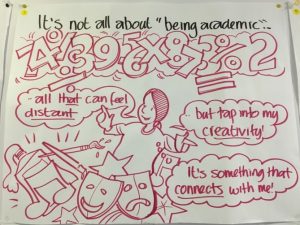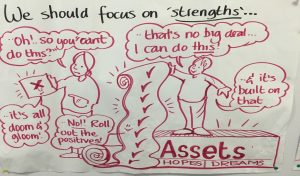Shelley Buckley talks us through the SQA’s Mental Health and Wellbeing Award, which was developed at the Good Shepherd Centre, and how this could change the way we perceive mental health.

Since 2017 I have been in the privileged position to work with the Good Shepherd Centre (GSC) team and the Scottish Qualifications Authority (SQA) qualifications development team. The focus of my work has been to support schools, colleges and organisations to consider why this award’s importance goes beyond attainment statistics. Mental Health education is not a cure, nor is it therapy, but it is the start of a conversation about the meaning we make of life. The award was designed to provide the basic building blocks of psychosocial education in respect of mental health and wellbeing.
What is education in mental health and wellbeing?
The award provides a framework that enables the learner to reflect more deeply about social, cultural, personal and environmental aspects. It is an opportunity to explore the impact of social norms, and interplay of socio-economic factors which can cause disadvantage and discrimination. It considers the technological revolution and its effect on our identity, how we interact with each other, and how this impacts our lives.
It supports how we connect experiences and our environment to emotional wellbeing and our emotional responses. How we think, feel and behave, our mind-sets, attitudes and the physiological effect of our emotional state on our bodies. Finally, the award encourages reflection on the terms self-care and coping strategies. Learners consider how we build resilience and reflect on the interplay between those practical skills and our lived experience. It challenges attitudes and language that reinforces shame and provides a safe space to reflect on difficult subjects.

Facilitate don’t dictate
One of the key aspects of the award is the facilitator’s role to support learners, to be conscious of their social world and lives. The content must be designed with the frame of reference of the learner in mind and the tone and pace should reflect meta-skills and learning skills. The potentially nebulous content gives the facilitator freedom to create a learning experience that reflects the needs and lived experience of the learner. The award itself supports a portfolio approach to learning; supporting active enquiry; critical and creative thinking; problem solving; analysis and reflection. Using a range of tools to support expression, scaffold skills development and meaning making promotes crucial life skills in navigating challenges and struggles when faced with transition, loss, daily pressure and problems of daily life.

Why is this important?
Mental health cannot be separated from physical wellbeing and social wellbeing, and because it is unseen and intangible, it is tricky to provide concrete educational outcomes that would reflect the diversity of society. What is good mental health, and the factors that help and hinder one person, may be different to, and for, another. This is why we find it so hard to talk about our mental health in a meaningful way without many of us feeling foolish or melodramatic. Stigma is driven by society’s expectations of what is deemed acceptable and unacceptable. This award is not about symptom spotting but rather educating ourselves on how we function best within our spheres of existence. It is an acknowledgement that there are no negative emotions or positive emotions – just emotions. Feeling angry, upset, frustrated, guilty or sad are often perfectly acceptable responses when taken into context; most of the time it is not an indicator of mental illness or disorder. It is important that we consider the behaviour and emotional responses of people in a socio-historical context.
A holistic approach to mental health and wellbeing education in secure care:
The Journey Project
In 2019, Alison Gough, Director of GSC (where the award was developed) took the lead with her team to develop a service which is trauma-informed and provides children with psycho-social education and specialist support, promoting a fundamental ethos shift from what is wrong with you to what happened to you? The centre has embarked on a whole systems change which would see trauma-informed practices and mental wellbeing embedded within every aspect of the environment. The rights of those compelled to be resident in secure would be given prominence in order to redress the balance of power. A range of projects with staff and young people would inform this process.
The Journey Project involves supporting the participation of all staff. They reflect on mental health and wellbeing from their perspective, personally and occupationally, and the changes which would need to take place in culture and practice. This process involved everyone from kitchen and maintenance staff, to managers, teachers and care staff. In partnership with Suzanne Faulkner, Teaching Fellow at Strathclyde University and Lego® Play facilitator, we supported those difficult conversations through the use of Lego® Serious Play, by using the same active enquiry which underpins the award itself. The mode and method not only creates a sense of ownership but it is also inclusive of everyone’s experience and personal narrative, no matter what their role is within the organisation. Staff and young people will work together to make changes organisationally, culturally and personally, placing voice, rights and informed choice at the heart of this process.
Mental health and wellbeing is an area of knowledge we, as a society, must take more ownership of. This does involve a paradigm shift, socially and politically. We need to take responsibility for the fact that, for some, those choices can be very limited due to disadvantage and oppression which is reinforced by stigma. Subjugation of power, rights, and choice is not a proactive way to support positive mental health.
Universal mental health education which supports meaning making and ownership of knowledge is the start of a conversation to enable society to be more informed, kinder, more tolerant and more realistic in our expectations of ourselves and others.
About our blogger
Shelly Buckley is Subject Implementation Manager, Mental Health and Wellbeing Awards, SQA & Social Work Consultant at the Good Shepherd Cent

Leave a Reply
You must be logged in to post a comment.